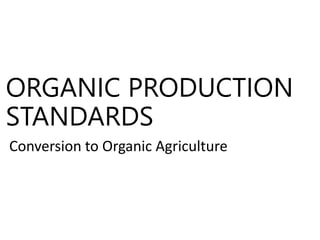
8. Organic-Crop-Production-Standards-Conversion-to-Organic-Agriculture.pptx
- 1. ORGANIC PRODUCTION STANDARDS Conversion to Organic Agriculture
- 2. OBJECTIVES: 1. Understand what is Conversion to Organic Agriculture, 2.Identify the benefits of organic farming and, to 3 know and familiarize the steps in successful transition to organic farming.
- 4. WHAT IS CONVERSION TO ORGANIC AGRICULTURE? It is the process of transitioning from conventional into organic method of farming.
- 5. GLOBAL AWAKENING ISSUES CAUSED BY THE CONVENTIONAL AGRICULTURE. ✓ Pollution ✓ Environmental Degradation ✓Climate Change ✓ Global Warming
- 7. BENEFITS OF ORGANIC FARMING 1. ENVIROMMENTALLY FRIENDLY 2. HEALTHIEST AND TASTIEST FOOD 3. GENERATES INCOME ✓Promotes Sustainable Agriculture. ✓ Does not cause to the environment. 4.INEXPENSIVE PROCESS ✓ Organically grown food has more nutrional value. ✓ It uses organic inputs. ✓ Does not require expensive inputs. ✓ Demand of organic food is very high. ✓ Generates income through export. 5. SOURCE OF EMPLOYMENT ✓Organic farming is more labour iintensive. Hence,generates more employment.
- 8. Steps to a Successful Organic Transition Transitioning farmers generally spend too much time worrying about replacing synthetic input with allowable organic product instead of considering management practices based on preventative strategies. The transition requires a numerous changes, one of the biggest changes is in the mindset of the farmer.
- 9. A) Understand the basics of organic agriculture and the organic farming standards. -transitional producers should be prepared to read appropriate information, conduct their own trials and participate in formal and informal training events. -Organic farming is a holistic system that relies on sound practices focused on preventative strategies. Since there are often few organic remedies available to organic producers for certain problems, prevention is the key element in organic production.
- 10. B) Identify resources that will help you -Existing organic farmers are generally very helpful in sharing valuable technical information. -Producers should also contact agrologists, veterinarians and other agricultural and financial consultants, in order to learn ways to improve their current farming practices. -The Internet is a valuable source of information, especially to new organic farmers.
- 11. C) Plan your transition carefully -Develop a transitional plan with clear and realistic goals. realistic timeframes. weaknesses, while building on strengths. multiple year budget and an effective/realistic marketing strategy. mechanical weeding equipment specialized composting equipment and applicators additional handling equipment dedicated to the organic products, and processing equipment.
- 12. ✓Careful planning is very important. During the early part of the transitional period, yields are often depressed and premium prices for certified organic products are generally not yet obtainable. Use realistic yields and prices when evaluating the feasibility of your project.
- 13. D) Understand your soils and ways to improve them -Soil is the heart of the organic farming system. -Fields with good drainage, good level of fertility and organic matter, adequate pH, biological health, high legume content, and with less weed and pest pressure, are excellent assets. -farmers must be able to recycle nutrients through proper nutrient management practices: recycling through good manure and compost utilization, crop rotations, cover crops (green manure, catch, and nitrogen fixing crops), and by reducing nutrient losses due to leaching, over-fertilization, as well as poor manure and compost management (storage, handling, and spreading).
- 14. E) Identify the crops or livestock suited for your situation Things to consider. • degree of difficulty to grow or raise the product organically. • land and soil suitability. • climate suitability. • level of demand for the product. • marketing challenges. • capital required. • current prices for conventional. • transitional and organic products. • profitability over additional workload.
- 15. F) Design good crop rotations -Crop rotations are extremely important management tools in organic farming. They can interrupt pest life cycles, suppress weeds, provide and recycle fertility, and improve soil structure and tilth. Some rotational crops may also be cash crops, generating supplemental income. ex. green manure,catch crop,cover crop. etc
- 16. G) Identify pest challenges and methods of control. -It is important to know the crop’s most common pests, their life cycle Several Measures: • crop rotation • sanitation • catch crops • flamers • introduction of beneficial insects • bio pesticides
- 17. H) Be ready to conduct your own on-farm trials. -Successful organic farmers continuously try new and/or innovative management practices. Practices such as cover cropping, inter-planting, and use of various soil and pest control materials need to be evaluated regularly by organic farmers. Be prepared to try new approaches.
- 18. I) Be ready to keep good records. -Record keeping is one of the most important requirements to maintain organic integrity. Farmers are expected to keep detailed production, processing and marketing information. This information includes everything that enters and exits the farm.
- 19. J) Avoid these common mistakes. • Underestimating the need for good transitional and marketing plans. • Underestimating the need to fully understand the Organic Standard. Organic producers must understand the standard in order to know what is permitted and prohibited. • Failing to think prevention. Transitional farmers should consider improving their crop rotation, soil and crop management skills, livestock management practices (feeding program, heard health program, grazing system, housing facilities, and husbandry).